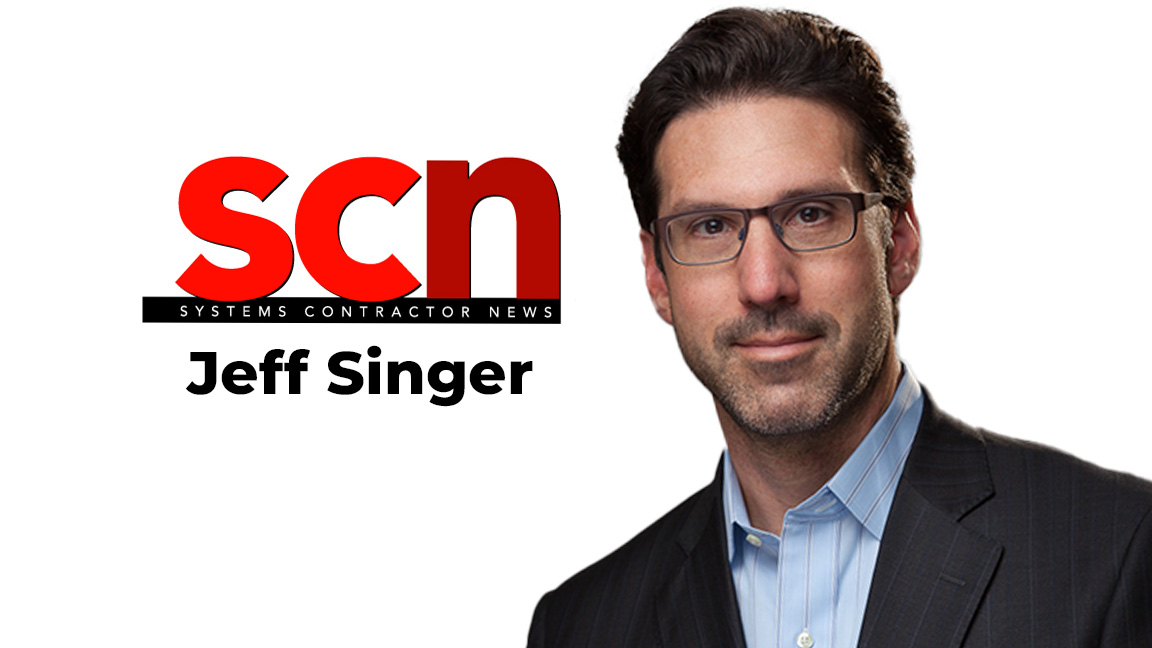The AV industry continues to thrive through tumultuous political, social, financial, and technological riptides. However, the seemingly firm ground on which we stand is anything but a solid foundation. We feel the tectonic shifts of our industry often as small tremors and sometimes as transformational sea changes, such as from box sales to system sales or from analog to digital. Now, perhaps we face another pivotal evolutionary moment.
[On Your Business: Sales Is Not a Four-Letter Word]
Our industry is a frog in a pot of water warming ever so slowly. We need to face the realities rather than hope everything remains the same. Because it won’t. Change is constant and inevitable.
Consolidation and Commoditization
Over the past several years, we have witnessed the consolidation of the integration channel, as large dealers acquire other dealers, big and small. As the sales channel shrinks, the remaining dealers are simultaneously refining their product catalog. Integrators realize that offering several similar product lines is an operational, technical support, and financial nightmare. It’s much more efficient and profitable to focus on only a few brands of each product category.
And it’s easy for integrators to pare down vendors, because manufacturers often design their products using the same chips—and even outsource their engineering and manufacturing to the same OEMs/ODMs. As a result, there is little or no difference among the many branded devices on the market today (and if there are unique value propositions, marketers struggle to clearly communicate them).
The commoditization of hardware is driving prices down in a race to the bottom. Profit margins on hardware for integrators are decreasing, leaving dealers to make up the difference in labor. Unfortunately, labor hours are dwindling, too.
[Making the Case for Managed Services]
Sorry for stating the obvious, but technology continuously (and with increased rapidity) evolves and improves. Most manufacturers now realize the market will no longer tolerate complexity. Even companies that built their businesses and reputations on customization are now touting “out-of-the-box functionality,” “interoperable ecosystems,” and “simple web-based configuration tools.”
Replacing Profits
Integrators simply won’t be able to make up for lost hardware profits with more installation and programming labor hours. Once the hardware is installed, there’s a 60% increased need for technical support, according to ConnectWise. Plus, the same 2022 study showed 70% of institutions look to managed service providers (MSPs) for technical support.
Managed services mitigate reliance on hardware and labor as profit engines. Integrators can maintain robust profitability from existing customers rather than from new projects, which is more stable. Managed services provide consistent engagement with customers, delivering value and building loyalty. Retaining customers is the most efficient path to profitability and consistent cash flow.
Managed services provide consistent engagement with customers, delivering value and building loyalty.
Recurring monthly revenue also makes financial planning much more accurate and realistic. Rising operational expenses, including rent, cost of goods, and even interest rates are cutting into shrinking profits. Couple increasing overhead with longer sales cycles (project close rates were down 15% in 2023 from the previous year) and lower revenue per project (also down 5.3% YOY in 2023), and cash flow quickly becomes inconsistent.
Financial planning becomes challenging, if not impossible, when you can’t accurately forecast revenue. This has a chilling effect on investments in inventory, headcount, marketing, vans, equipment, showrooms, and more.
According to the NSCA 2023 State of the AV Industry report, 57% of integrators earn less than or equal to 20% project-based profit margins. Financial experts state that gross profit margins below 30% are considered “dangerous” and not sustainable long-term. Meanwhile, the average profit margin for managed services is a healthy 52%.
Explaining Value
Services are the most profitable product integrators have in their portfolio, yet sales teams rarely offer it. Many integrators don't view managed services as a strategic priority and don't structure their businesses or commissions to focus on selling services.
Plus, sales and marketing don’t know how to express the value of managed services. Integrators must go beyond a simple break-fix offering or providing “receipts” for a required SLA. Customers want 100% uptime, device and room usage analytics, asset management, immediate response time, budget planning, and warranty and license renewal tracking.
It’s not surprising that the attach rate for those who even offer services is an anemic 10%. To thrive in the future, managed services will need to account for about 40% of revenue.
[Cloud Power: Pricing Modern Infrastructures]
A feature-rich, reliable, and user-friendly software platform is required. It seems almost every hardware manufacturer is promoting their own “single pane of glass” software. In fact, most platforms are aspirational and are not nearly as robust as they claim. Many are difficult to implement. Manufacturers should offer pre-loaded appliances, robust training and certification programs for integrators, and direct technical support (at least to support the integrator on their first installation).
The backend financial operations of most integrators are not structured to support selling managed services. Today, accounting and compensation packages are designed for project-based CapEx transactions. The CapEx financial model does not align with OpEx budgeting or sales. It all becomes an accounting nightmare.
The Right Workforce
Staffing is another challenge. To deliver on the promise of managed services, humans are needed to constantly monitor systems and/or immediately respond to alerts. Expertise in implementing, updating, servicing, and utilizing the managed services software becomes much more important to earning and maintaining customer trust and loyalty.
Highly skilled technicians will always be needed, but maybe not in the same numbers or used in the same ways. Most support calls are Level 1 user errors or an easily remedied issue, such as cycling the power or switching an input. Those corrections can be done automatically and remotely. Level 2 issues, which require some technical experience, can also be handled remotely. Only the limited Level 3 issues require a truck roll and expert technician, allowing your top techs to focus on mostly new installations.
No one likes change—and fundamentally changing a business model that has worked for decades requires bold, courageous leadership. Establishing the need, commitment, patience, and vision within an organization to transition from a pure CapEx model to at least a partial OpEx model is critical for success, and it can be done.

